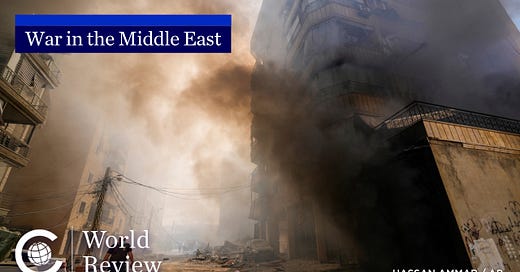Each Friday morning, I host a video podcast called “World Review with Ivo Daalder” where three journalists from major news outlets around the world join me in discussing the latest global news stories of the week.
This morning, October 4, I was joined by Nahal Toosi of Politico, Peter Spiegel of the Financial Times, and Philip Stephens who writes the Inside-Out Substack
“World Review is always fascinating. I love the fact that you can get journalists from around the world to participate since zoom is the medium.”
— A Subscriber to America Abroad
While I encourage you to watch or listen to the episode (and subscribe wherever you get your podcasts!), here are a few interesting things I took away from our discussion:
For almost a year, the Biden Administration has led efforts to ensure that the terrorist attacks by Hamas against Israel would not escalate into a regional war. The actors in the region had different ideas. After Hamas killed more than a thousand Israelis on Oct 7 last year, Hezbollah launched rocket attacks against the North of Israel. Soon, Houthis in Yemen targeted shipping lanes in the Red Sea, and Iranian-backed militias in Syria and Iraq attacked U.S. and other forces. Israel and the U.S. responded in an effort to convince Iran to hold back its resistant forces. It worked. Sort of. But apparently no longer. In the last few weeks, the wars in the region have all escalated … in Lebanon, on the West Bank, in Yemen, and most importantly with Iran. After Israel killed the Hezbollah leadership in a series of attacks and invaded Lebanon, Iran responded by launching nearly 200 missiles without warning. The region is on edge. Awaiting an Israeli response, which everyone knows is coming. What can we expect next?
Iran, Nahal noted, has sought to avoid direct confrontation with Israel (and, by extension, the United States). Hamas’s terror attack almost certainly happened without Tehran’s connivance, nor is it evident that Hezbollah, the Houthis, or the militias responded at its behest. Like Washington, Tehran does not want a regional war. It told the militias and Iraq and Syria to stop shelling US forces. It urged Hezbollah to keep its war limited. It’s not clear to what extent it exercised restraint over the Houthis — or even if the Houthis were listening. But despite efforts to keep things under control, Iran has seen its deterrent steadily eroding, especially in the last few weeks, after Israel announced a new phase in the war and targeted Hezbollah’s leadership and missile forces. Its missile launch earlier this week was designed to re-establish deterrence. The big question is whether it will work.
Israel, meanwhile, seems to have turned a corner — and decided that now may be the best time to destroy its enemies, not only Hamas and Hezbollah but also Iran, which is the core threat. Philip argued that Benyamin Netanyahu has pursued a consistent policy since he returned to power in 2009: Remain in power. Destroy prospects for a two-state solution. Force the United States to destroy Iran’s nuclear program. He’s achieved goals one and two. He now sees an opportunity to achieve the final goal: eliminating Israel’s arch-enemy.
Will the US play ball? That was the question we debated. Peter thought that the US would try and restrain Israel. Biden wants to avoid a war with Iran at almost all costs, though he knows he cannot fully constrain Israel, either now before the elections or even afterwards. If Biden could convince Netanyahu to respond proportionately — hit military targets but not the nuclear or oil facilities — mutual deterrence might be restored. Nahal also thought that a limited strike (perhaps against oil facilities) might convince Iran not to respond. Philip and I were less sanguine. The war has changed from Israel fighting Iran’s proxies to Tel Aviv fighting Tehran. It’s not clear how — or who — can or will prevent further escalation.
That’s it for my quick takes of this week’s episode here on America Abroad. To get the full flavor, please listen to the episode itself.





